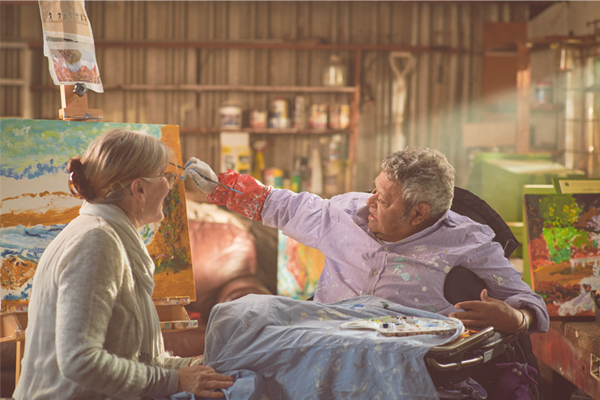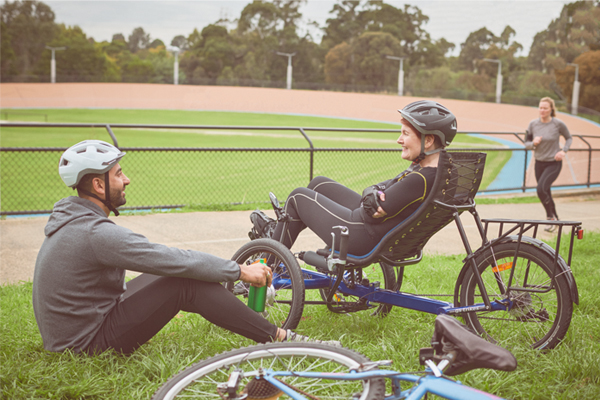What It’s Actually Like To Be A Care And Support Worker
Care and support workers help thousands of people with disability, older Australians, and veterans every day. Here's what the job's actually like.


The care and support sector is now hiring at careandsupportjobs.gov.au
Every day, thousands of people with disability, older Australians, and veterans are supported by care and support workers who are passionate about giving back to their communities.
If this sounds like you, chances are you’re considering embarking on a career in the care and support sector. Go you! Care and support work is an incredibly varied career path with lots of opportunities for growth and professional development.
But, as with all career decisions, you might find yourself wondering what it’s actually like to be a care and support worker. Say no more, fam.
What Do Care And Support Workers Do?
There are a lot of misconceptions surrounding care and support work that could be holding people back from jumping into this incredibly rewarding line of work. Among the most common is the belief that care and support workers primarily work ever-changing shifts in community centres or facilities.
The truth is, the type of work and where it’s done depends on the needs of the people requiring care or support, and that means care and support workers can be found pretty much everywhere.
The primary aim of care and support work is to help all Australians live full, independent lives. That often means spending a lot of time in someone’s home or the care facility where they live. You could find yourself helping with meal prep or exercise, but you’ll also spend a lot of time supporting people when they’re out and about enjoying a spirited social life.
That might include attending live gigs, sporting events, outdoor activities, or trips to the movies with friends.
All this time spent together means most care and support workers build close relationships with the people they support, fostering a deep understanding and respect for that person’s interests and goals.

Who Do Care and Support Workers Assist?
Care and support workers come from an array of personal and professional backgrounds, and they work with Australians from all walks of life. People require care and support for lots of different reasons and in many different capacities.
Some of the key groups care and support workers assist are people with disability, older people, and veterans.

What Kind Of Career Progression Can I Expect As A Care And Support Worker?
We’ve covered a lot of ground in terms of who care and support workers assist and what they do day-to-day, but that’s really just the beginning. There are heaps of opportunities to develop and apply the skills you learn as an entry-level care and support worker in a range of different fields.
If you love the personal nature of one-on-one support, you could specialise in providing support for a particular group, like people with more complex types of disability.
Or you can pivot to providing specialised health care as a physiotherapist, speech pathologist, or registered nurse by undertaking further study and attaining qualifications.
If you like the idea of driving change in the sector more broadly, you could grow into a leadership or management role, coordinating teams and managing care plans. This busy and varied sector also needs administration staff in fields like finance and HR.
One of the best things about working in the care and support sector is that there are so many ways to shape your career around your personal interests and passions, all while supporting other people in the process.

How Do I Become A Care And Support Worker?
Glad you asked! There are heaps of different avenues into care and support work – perhaps you’re finishing high school soon and are starting to think about what you’d like to do, or maybe you’ve been inspired to make a career change after a couple of pretty challenging years.
There are no minimum qualifications for some care and support jobs, but you’ll be required to complete a screening test (which includes a police background check). If you want to work with the National Disability Insurance Scheme (NDIS), you’ll need to complete an NDIS Worker Screening Check. Some states and territories require care and support workers to also obtain approval for working with vulnerable groups.
There are plenty of training opportunities that can boost your skills in the care and support sector. A Certificate III in Individual Support is a starting point for learning how to deliver person-centred support for people with disability, older people, or veterans. A Certificate III in Allied Health Assistance will prepare you to support allied health professionals providing care and support.
Other roles, like registered nursing, physiotherapy, and occupational therapy, require tertiary qualifications.
Paperwork aside, if you like the idea of working with people and supporting others in your community via a diverse and rewarding job, you’re already half-way there.
—
The care and support sector is now hiring! With a job in aged care, disability, or veterans’ support, you’ll find career pathways and work flexible hours while you learn. Now hiring at careandsupportjobs.gov.au
—
Images courtesy of Australian Government

